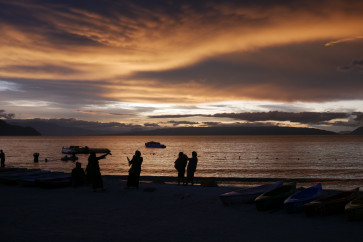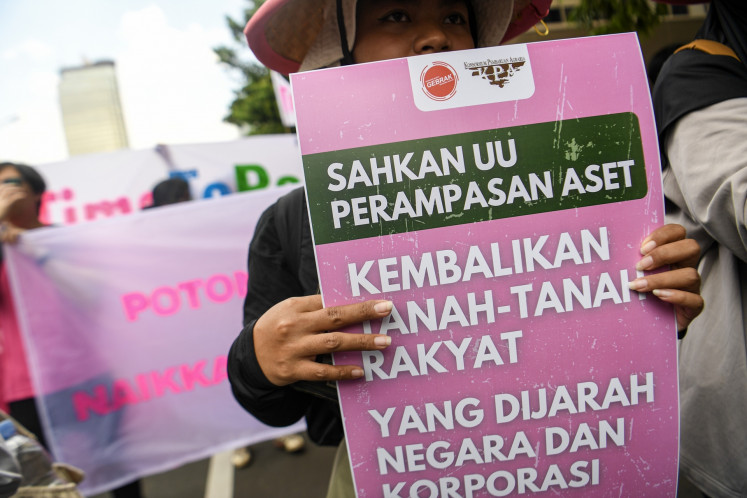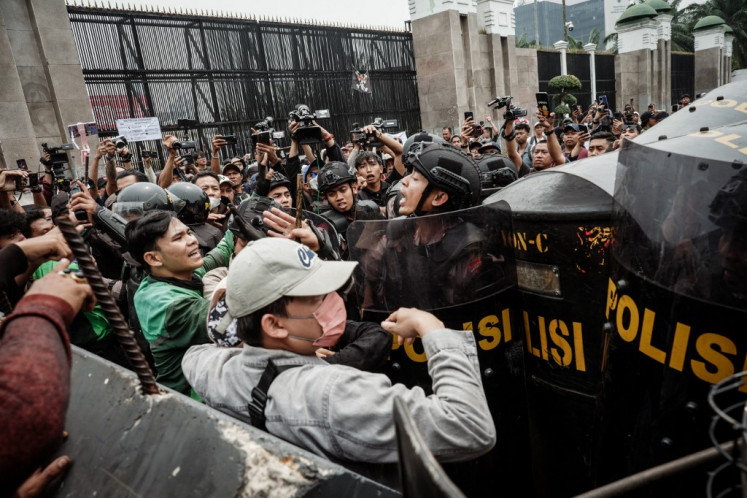Popular Reads
Top Results
Can't find what you're looking for?
View all search resultsPopular Reads
Top Results
Can't find what you're looking for?
View all search resultsGovt accused of deceit over hydropower projects
Hydropower developers have accused the government of misleading businesses when it backpedaled from a favorable policy to develop renewable energy, adding to a new list of regulatory uncertainties plaguing the energy sector
Change text size
Gift Premium Articles
to Anyone
H
ydropower developers have accused the government of misleading businesses when it backpedaled from a favorable policy to develop renewable energy, adding to a new list of regulatory uncertainties plaguing the energy sector.
The problem centered around a decision by several independent power producers (IPPs) to agree to the government’s demand to sign power purchase agreements (PPAs) with state power company PLN despite some details not having been agreed on.
The government has promised that if the IPPs agree to immediately sign the PPAs all contentious issues will be resolved through future negotiations.
However, instead of getting favorable policies the IPPs have to carry a burden that will render the projects financially unfeasible, the Association of Hydroelectric Power Plant Developers (APLTA) said on Wednesday.
APLTA chairman Riza Husni told The Jakarta Post that when negotiating the details of the agreements, the IPPs found out that the ministry, through PLN, tried to include a number of questionable clauses in the PPAs.
For instance, Riza said, the IPPs were obliged to develop their power plants using the build, own, operate, transfer (BOOT) scheme within a period of 25 years, then sell the property to PLN at the end of the agreement for US$1,000 and that all taxes applied during the projects’ transfer would be borne by the IPPs.
Riza said the IPPs had no other option but to sign the PPAs because they had since 2015 spent time and money on the study and had even purchased plots to develop the plants.
“Ideally, IPPs should negotiate the PPA first with PLN, sign it and later make a deposit in a bank as a construction guarantee. But what really happened over the past several months was that the IPPs were forced to sign the agreements and now they are still negotiating the details with PLN,” Riza.
From August to November, the Energy and Mineral Resources Ministry witnessed the signing of 66 PPAs between PLN and various IPPs for renewable plants to generate 1,189.2 megawatts (MW) of electricity, 84 percent of which were hydropower plants.
Both the ministry and PLN had touted the achievement, saying that Indonesia had never been able to seal as many deals and that the country was on the right track to meet its Paris Climate Agreement to reduce greenhouse gas output by 29 percent by 2030.
But with the agreements unraveling it is likely that the projects’ construction will be shelved by investors.
Another issue hampering the IPPs is a clause exempting PLN from an obligation to purchase electricity from the hydropower plants.
The IPPs are required to agree on renegotiating the PPAs if PLN decides to do so. The developers were also told to take PLN to court if they refused to comply with PLN’s demand.
Riza said after forcing the IPPs to set a low price for hydropower, PLN only wanted to pay for the renewable electricity in rupiah, forcing the developers to take the foreign exchange risk. “Hence, looking at such one-sided PPAs, domestic banks are reluctant to provide soft loans.”
The Indonesian Chamber of Commerce and Industry’s (Kadin) deputy chairman for renewable energy, Halim Kalla, said many hydropower developers could not proceed with their projects due to financial concerns.
“How could they proceed if they have to follow such difficult requirements, including the one obliging them to transfer the plants to PLN at the end of the agreement?” Halim said.
The Energy and Mineral Resources Ministry could not be reached for comment.
However, PLN renewable energy division head Tohari Hadiat said the IPPs should have calculated all of the risks when signing the PPAs. “When we’re talking about the economical aspect of a project, it depends on two things: price and costs. As the price has been set, the IPPs should find a way to minimize the costs of their projects otherwise banks won’t be interested in providing loans.”










